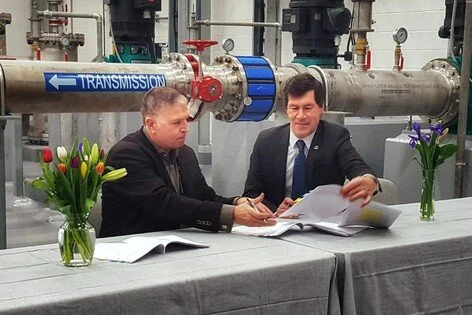The head of the UN atomic agency toured Japan's tsunami-wrecked Fukushima nuclear power plant on Wednesday and said he is satisfied with still-contentious plans to release treated radioactive wastewater into the Pacific Ocean. International Atomic Energy Agency chief Rafael Mariano Grossi observed where the treated water will be sent through a pipeline to a coastal facility, where it will be highly diluted with seawater and receive a final test sampling. It will then be released 1 kilometre (1,000 yards) offshore through an undersea tunnel.
Japan Set to Pour Fukushima Waste Into Pacific, Irking China
Japan is set to win approval to discharge more than a million cubic meters of treated water from the Fukushima nuclear disaster site into the Pacific Ocean, a contentious plan that’s soured ties with neighbors including China. The International Atomic Energy Agency’s Director General Rafael Grossi will visit Japan from Tuesday to deliver a final report on the safety of the process and meet with officials including Foreign Minister Yoshimasa Hayashi. A domestic nuclear regulator is also set to issue a crucial assessment.
Emerging contaminants found in treated Eastern Townships water
Emerging contaminants, such as medicine and other industrial waste, have been found in the waters of Granby, Bromont and Cowansville, even after being treated, according to a local environmental committee. Reports from the Organisme de bassin versant de la Yamaska (OBV) show concerning data for the environment, despite Quebec's director of public health, Luc Boileau, saying last week that water in the province is very drinkable.
Imperial Oil still investigating cause of produced water spill in N.W.T.
Imperial Oil Ltd. says it is still investigating the cause and impact of a pipeline spill in the Northwest Territories that has some residents downstream concerned about the potential impact. The Calgary-based oil and gas company reported on July 27 that it discovered about 55,000 litres of produced water had spilled before it shut down the pipeline in Norman Wells, N.W.T.
EPCOR adjusting water chemistry to mitigate lead
Starting in December 2022, EPCOR will add orthophosphate to its treated water to reduce lead. As EPCOR is Leduc’s water provider, this includes our community’s water supply. Orthophosphate is an odorless, tasteless substance that creates a protective barrier on plumbing surfaces to reduce the release of lead in drinking water from all sources, including lead service lines and plumbing. Many municipalities across North America use orthophosphate. It has no negative health effects, and is endorsed by Alberta Health Services and Alberta Environment and Parks.
26% of Hamilton drinking water doesn't make it to taps. Here's what the city is doing
The city has a new plan to detect water leaks faster, after the revelation that a quarter of its fresh drinking water never makes it to Hamilton homes. Twenty-six per cent of the treated water destined for local taps, or 19.916 megalitres per year, escapes through broken and leaky pipes, says Dave Alberton, Hamilton's manager of water distribution. That's higher than the provincial average of 15 per cent, he said, and it's expensive and bad for the environment.
Sachs Harbour boil water advisory has been lifted
The boil water advisory in Sachs Harbour, N.W.T., has been lifted, according to a Monday news release. The boil water advisory had been put into effect in early June due to higher than normal turbidity levels (muddy water). The levels have since dropped to "acceptable levels" in treated water from the water plant and "all issues" have been corrected. There have been no illnesses associated with drinking water reported in the community, the release says. The normal use of drinking water can resume.
Read the Cold Lake Sun Article
Bonnyville residents will be drinking Cold Lake water this week after a supply agreement was signed between the Cold Lake Regional Utility Services Commission and the Bonnyville Regional Water Commission on Jan.26. The agreement details the pricing, as well as the distribution framework, with Cold Lake RUSC being the supplier of the water to the BRWSC.
West Saint John homes could link to new water supply in two weeks
People in six west Saint John neighbourhoods could have new drinking water in two weeks. Those areas; Randolph, Milford, Fundy Heights, Lower West, Duck Cove and Sand Cove, will be disconnected from the current groundwater well system and switched to treated water from the Loch Lomond Lakes on the city's east side as early as Feb. 12. City water commissioner Brent McGovern said there will be a changeover period of as much as two weeks during which water from both sources will be in the system.










